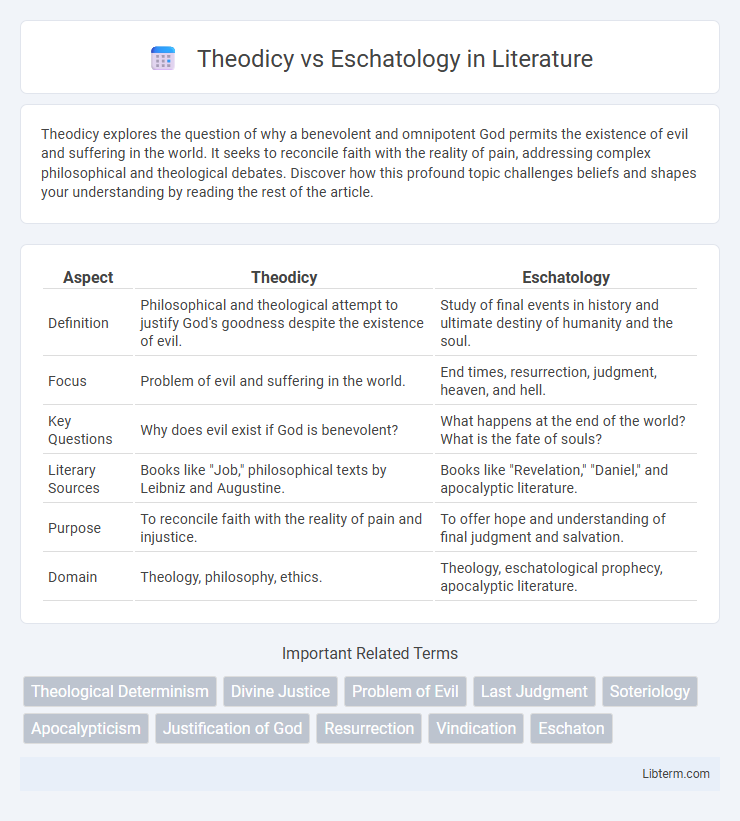Theodicy explores the question of why a benevolent and omnipotent God permits the existence of evil and suffering in the world. It seeks to reconcile faith with the reality of pain, addressing complex philosophical and theological debates. Discover how this profound topic challenges beliefs and shapes your understanding by reading the rest of the article.
Table of Comparison
| Aspect | Theodicy | Eschatology |
|---|---|---|
| Definition | Philosophical and theological attempt to justify God's goodness despite the existence of evil. | Study of final events in history and ultimate destiny of humanity and the soul. |
| Focus | Problem of evil and suffering in the world. | End times, resurrection, judgment, heaven, and hell. |
| Key Questions | Why does evil exist if God is benevolent? | What happens at the end of the world? What is the fate of souls? |
| Literary Sources | Books like "Job," philosophical texts by Leibniz and Augustine. | Books like "Revelation," "Daniel," and apocalyptic literature. |
| Purpose | To reconcile faith with the reality of pain and injustice. | To offer hope and understanding of final judgment and salvation. |
| Domain | Theology, philosophy, ethics. | Theology, eschatological prophecy, apocalyptic literature. |
Understanding Theodicy: Defining the Problem of Evil
Theodicy addresses the problem of evil by seeking to justify God's goodness despite the existence of suffering and moral evil in the world. It explores philosophical and theological explanations for why an omnipotent, omnibenevolent deity allows pain, often engaging with concepts such as free will, soul-making, and the necessity of evil for greater goods. In contrast to eschatology, which focuses on the ultimate destiny of humanity and the final events of history, theodicy centers specifically on reconciling the presence of evil with divine justice and benevolence.
Unpacking Eschatology: Exploring Ultimate Destinies
Eschatology investigates the ultimate destinies of humanity, focusing on themes such as the afterlife, judgment, resurrection, and the final destiny of souls according to religious traditions. Theodicy, by contrast, addresses the problem of evil and suffering in relation to the existence of a benevolent God, seeking to reconcile divine justice with worldly injustice. Unpacking eschatology reveals diverse interpretations of salvation, damnation, and cosmic renewal, highlighting the significance of end-time beliefs in shaping moral and existential frameworks.
Theodicy Through Historical and Philosophical Lenses
Theodicy examines the problem of evil and suffering in relation to divine justice, questioning how a benevolent God permits hardship throughout history. Philosophical approaches to theodicy analyze arguments from thinkers such as Leibniz, who coined the term, to contemporary debates on free will and the nature of evil. Historical contexts reveal the evolution of theological responses, illustrating shifts from classical theodicies to modern interpretations integrating human autonomy and cosmic justice.
Eschatological Views Across Major World Religions
Eschatological views across major world religions encompass diverse beliefs about the ultimate destiny of humanity and the cosmos, including concepts of judgment, resurrection, and afterlife. Christianity emphasizes the Second Coming of Christ and the final judgment, while Islam teaches about the Day of Qiyamah with resurrection and divine reckoning. Hinduism and Buddhism present cyclical views of time with reincarnation and eventual liberation (moksha or nirvana), contrasting with the linear eschatology seen in Abrahamic faiths.
Key Differences Between Theodicy and Eschatology
Theodicy addresses the problem of evil by explaining why a benevolent and omnipotent God permits suffering and injustice in the present world, focusing on moral and philosophical justifications. Eschatology explores the ultimate destiny of humanity and the end times, including themes such as resurrection, judgment, and the fulfillment of divine promises. While theodicy grapples with the existence of evil in the current life, eschatology looks forward to future events that resolve or transcend worldly suffering.
Intersections: How Theodicy and Eschatology Interact
Theodicy and eschatology intersect by addressing the problem of evil in relation to ultimate justice and the final destiny of humanity. Theodicy seeks to justify God's goodness despite the presence of evil, while eschatology explores the consummation of history, including judgment and the restoration of order. Together, they provide a framework where the resolution of suffering is anticipated in the eschatological hope of redemption and divine justice.
The Role of Suffering in Theodicy and Eschatology
Theodicy addresses the problem of suffering by attempting to justify God's goodness despite the existence of evil and pain in the world. Eschatology frames suffering as a temporary phase leading to ultimate justice, redemption, and the restoration of all things in the end times. Both disciplines explore suffering's purpose, with theodicy providing moral and philosophical explanations and eschatology offering a hopeful, future-oriented resolution.
Contemporary Debates: Theodicy and Modern Eschatological Thought
Contemporary debates on theodicy focus on reconciling the existence of evil with an omnipotent, benevolent God, often challenging traditional explanations through philosophical and theological critiques. Modern eschatological thought increasingly integrates social justice and ecological concerns, reinterpreting end-time narratives to address current global crises and human suffering. These evolving perspectives highlight tensions between classical theodicy's emphasis on divine justice and eschatology's hope for ultimate restoration and redemption.
Theodicy, Eschatology, and the Search for Meaning
Theodicy explores the justification of divine goodness despite the existence of evil and suffering, addressing humanity's quest to find meaning amid pain. Eschatology examines the ultimate destiny of the soul and the universe, offering hope through beliefs in resurrection, judgment, and eternal life. Together, these fields engage the profound search for meaning, reconciling present suffering with future hope in religious thought.
Comparative Perspectives: Implications for Faith and Reason
Theodicy addresses the problem of evil by reconciling the existence of suffering with an omnipotent, benevolent deity, while eschatology explores the ultimate destiny of humanity and the cosmos, shaping beliefs about divine justice and final judgment. Comparative perspectives reveal that theodicy challenges faith to explain present injustices, whereas eschatology offers hope and resolution through future divine intervention. Reason engages critically with both by weighing historical, philosophical, and theological arguments about suffering, morality, and the nature of the afterlife.
Theodicy Infographic

 libterm.com
libterm.com